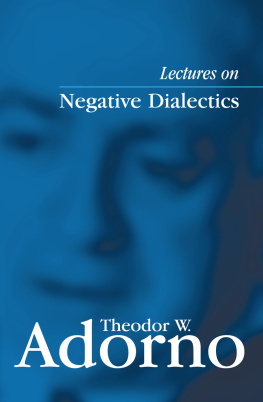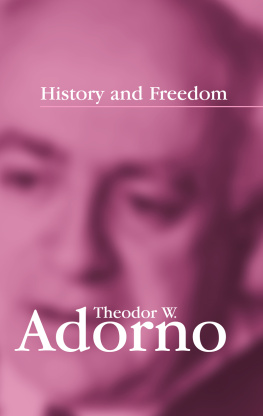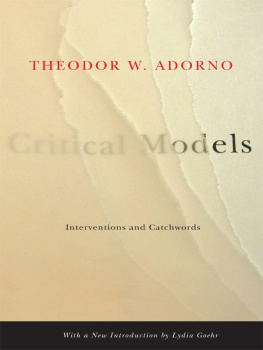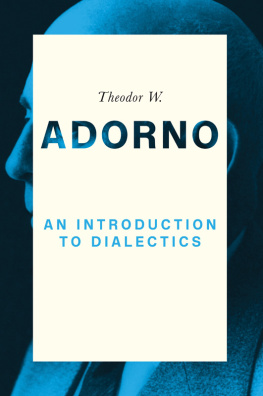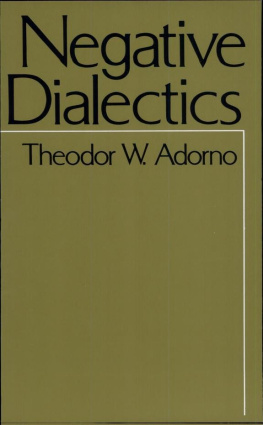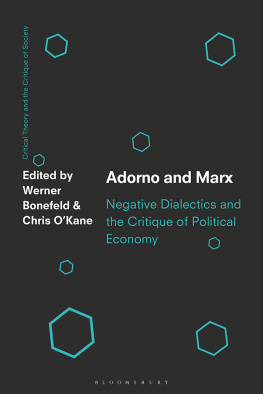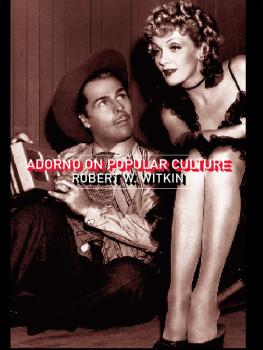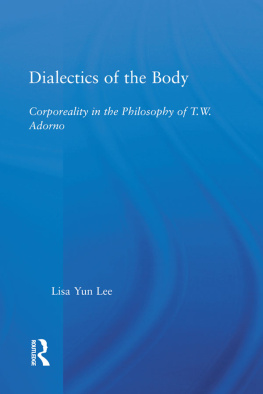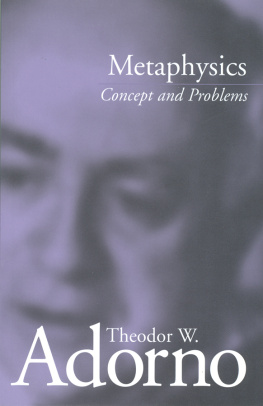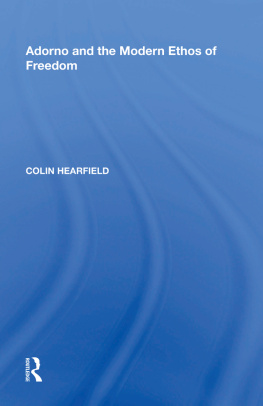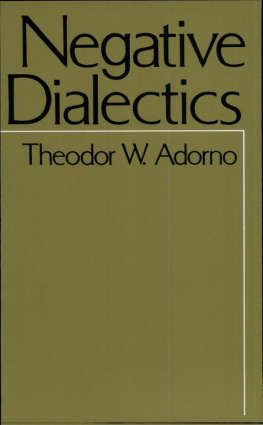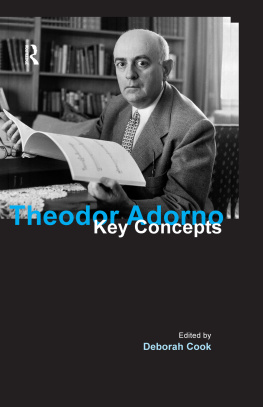Theodor W. Adorno - Lectures on Negative Dialectics
Here you can read online Theodor W. Adorno - Lectures on Negative Dialectics full text of the book (entire story) in english for free. Download pdf and epub, get meaning, cover and reviews about this ebook. year: 2014, publisher: Wiley, genre: Religion. Description of the work, (preface) as well as reviews are available. Best literature library LitArk.com created for fans of good reading and offers a wide selection of genres:
Romance novel
Science fiction
Adventure
Detective
Science
History
Home and family
Prose
Art
Politics
Computer
Non-fiction
Religion
Business
Children
Humor
Choose a favorite category and find really read worthwhile books. Enjoy immersion in the world of imagination, feel the emotions of the characters or learn something new for yourself, make an fascinating discovery.
- Book:Lectures on Negative Dialectics
- Author:
- Publisher:Wiley
- Genre:
- Year:2014
- Rating:4 / 5
- Favourites:Add to favourites
- Your mark:
- 80
- 1
- 2
- 3
- 4
- 5
Lectures on Negative Dialectics: summary, description and annotation
We offer to read an annotation, description, summary or preface (depends on what the author of the book "Lectures on Negative Dialectics" wrote himself). If you haven't found the necessary information about the book — write in the comments, we will try to find it.
The EPUB format of this title may not be compatible for use on all handheld devices.
Lectures on Negative Dialectics — read online for free the complete book (whole text) full work
Below is the text of the book, divided by pages. System saving the place of the last page read, allows you to conveniently read the book "Lectures on Negative Dialectics" online for free, without having to search again every time where you left off. Put a bookmark, and you can go to the page where you finished reading at any time.
Font size:
Interval:
Bookmark:


First published in German as Vorlesung ber Negative Dialektik, edited by Rolf Tiedemann Suhrkamp Verlag Frankfurt am Main, 2003
This English edition Polity Press, 2008
Polity Press
65 Bridge Street
Cambridge CB2 1UR, UK
Polity Press
350 Main Street
Malden, MA 02148, USA
All rights reserved. Except for the quotation of short passages for the purpose of criticism and review, no part of this publication may be reproduced, stored in a retrieval system, or transmitted, in any form or by any means, electronic, mechanical, photocopying, recording or otherwise, without the prior permission of the publisher.
ISBN-13: 978-0-7456-3509-5
ISBN-13: 978-0-7456-3510-1 (pb)
ISBN-13: 978-0-7456-9457-3 (epub)
ISBN-13: 978-0-7456-9364-4 (mobi)
A catalogue record for this book is available from the British Library.
For further information on Polity, visit our website: www.polity.co.uk
The German word Geist (spirit, mind, intellect) and its adjective geistig have presented particular difficulties in this translation. Normally, the translator tries to achieve consistency, but that has proved hard in this instance. Geist is commonly translated as spirit (as in Hegel's Phenomenology of Spirit), and this was an important component of Adorno's intellectual heritage. Spirit has therefore been the translation of choice in some instances. But to translate the essay in the Appendix Zur Theorie der geistigen Erfahrung as The Theory of Spiritual Experience would convey entirely the wrong impression in English, because of the strong theological overtones that are quite absent from Adorno's text. In the published version of Negative Dialectics, Adorno refers to Geist as a semi-theological word (p. 38), but those overtones are too intrusive in English. Equally, mind in the sense of mind and matter is normally rendered in German by Geist und Materie. Mind and mental have proved to be possible renditions in a number of passages, but I have opted on the whole for intellect and intellectual in the example given above and elsewhere. However, no single term has proved viable in every case. The fact is that the term Geist falls somewhere between the available English words spirit, mind, intellect with all of which it also overlaps. Each of these terms seems to work in some instances, but not in all. For that reason I have felt constrained to sacrifice consistency to what seemed appropriate in the given context. Something of the word's flavour can perhaps be gleaned from this passage from Lecture 9: Admittedly, you must be very clear in your own minds that this concept of intellectual [geistig] experience is infinitely far removed from the trivial concept of experience. This is because the concept of the fact, of data, that is canonical for empiricist philosophies and which is based on sense experience, that is, on sense data, has no validity for intellectual experience, which is the experience of something already intellectual and is an intellectually mediated experience (p. 89).
Between 1960 and 1966 Adorno accompanied the writing of Negative Dialectics with four courses of lectures. In the last of these he developed the themes that stand at the beginning of the book which finally appeared in 1966. They figure in what he called the Introduction, doubtless an echo of Hegel's Phenomenology of Spirit. Hegel's introduction, like his book as a whole, treats the experience of consciousness, or rather the science of consciousness, and this appears to have been echoed in Adorno's own terminology when he considered giving his introductory text the title Theory of Intellectual [geistig] Experience, adding that he wished to expound the concept of philosophical experience (Negative Dialectics, p. xx). Adorno did not hesitate to use intellectual experience as a synonym for full, unreduced experience in the medium of conceptual reflection (ibid., p. 13; see also p. 82 below). A theory of intellectual experience such as the one he sketched in the introduction to Negative Dialectics, and parallel to that in the lectures on the same topic, would amount to something like a methodology of his philosophy, if we could speak of such a thing. Adorno himself referred to Negative Dialectics as a whole as a methodology of his material works only to contradict this in the very next breath: No continuum exists between those works and it, according to the theory of negative dialectics. The discontinuity will be dealt with, however, and so will the directions for thought to be gleaned from it. The procedure will be justified, not rationally grounded. To the best of his ability the author means to put his cards on the table which is by no means the same as playing the game (ibid., p. xix). These observations strikingly fail to do justice to the text of Negative Dialectics. Adorno repeatedly emphasized that his material works could not be subsumed under a fixed method, that they could not be separated from their objects, and that their contents could not simply be transferred to other topics. When we examine his texts, this becomes only too apparent. But what could Negative Dialectics be other than an ensemble of material works on ontology, on the philosophy of history and moral philosophy or on metaphysics; we might also say: on Heidegger, Hegel or Kant or the possibility of philosophy after Auschwitz? At best, the central section of the book, on the concept and categories of a negative dialectics, might be construed as belonging to what has traditionally been thought of as a doctrine of method. And as far as ineffectual Instructions for Thinking are concerned no opponent of Adorno's could do him a greater injustice than to attempt to reduce his chef d'oeuvre to vague instructions of whatever sort. After all, what could the game be if not the treatment of the discontinuity between material and methodological philosophizing? Only if we stick to the literal meaning of methodology, to the immanent in every method; only if we expect no method in particular, but the justification of a plurality of methods and, tendentially, of the various distinct methods of all Adorno's writings, does the concept of method used in the Preface of Negative Dialectics, and also in the present volume of lectures, make sense. It would be better, however, for us to follow Adorno's example in his essay on The Experiential Content of Hegel's Philosophy and speak of the models of intellectual experience that motivate Adorno's thinking and make up its truth content (see Hegel: Three Studies, p. 53). The verse of Kstner's cited in the present volume of lectures, Herr Kstner, where's the positive side? (see pp. 12 and 17 below), could be matched and can still be matched today by the equally insipid question What method do you use, Herr Adorno? It appears as if on one occasion he wished to make a few concessions in this direction and force his thinking into the requisite methodological corset, only to end up by going against his own intentions and immersing himself once more in material philosophizing, be it only philosophizing about the antinomy of method and intellectual experience.
Adorno frequently attempted to formulate the deeply unsatisfactory nature of all traditional philosophy, its inappropriateness to its subject, its repudiation by the worldly wise. He hoped to lead thought along the only critical path that remains open, by identifying such fallacies as thinking of a first philosophy, origin thinking, the primacy of subjectivity, the universal rule of domination and also as the constitution of method. Method in the precise sense was for him an intellectual approach which can be applied everywhere and at all times because it divests itself of any relation to things, i.e. to the object of knowledge (
Next pageFont size:
Interval:
Bookmark:
Similar books «Lectures on Negative Dialectics»
Look at similar books to Lectures on Negative Dialectics. We have selected literature similar in name and meaning in the hope of providing readers with more options to find new, interesting, not yet read works.
Discussion, reviews of the book Lectures on Negative Dialectics and just readers' own opinions. Leave your comments, write what you think about the work, its meaning or the main characters. Specify what exactly you liked and what you didn't like, and why you think so.

